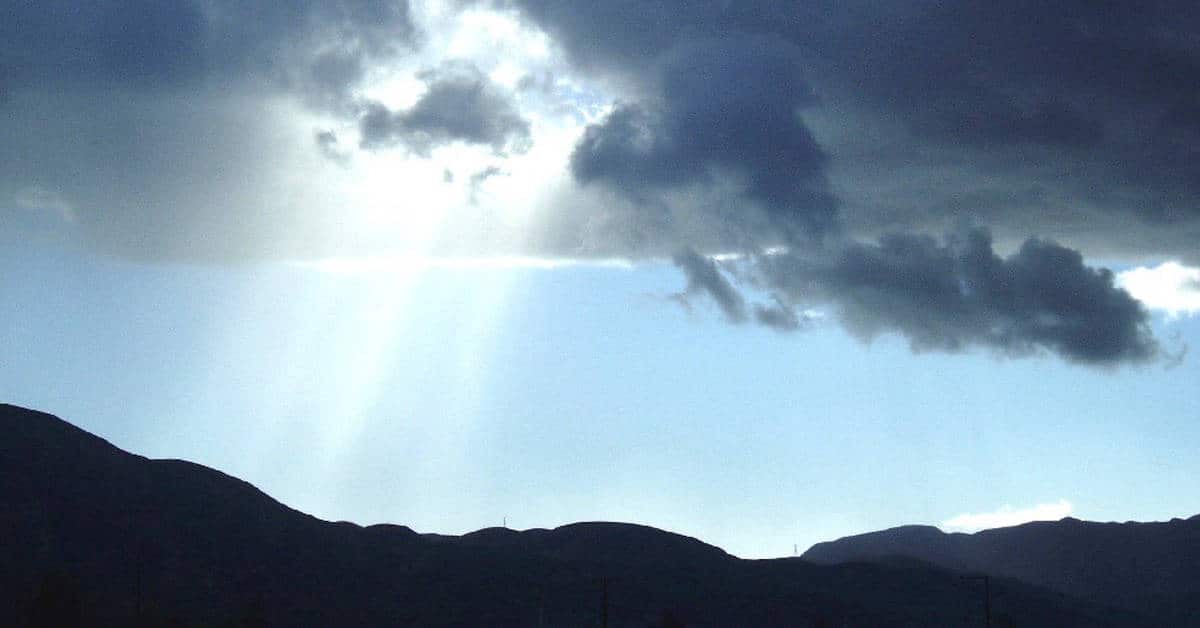By Wayne Jacobsen
BodyLife • November 1997
From out of no where it seemed the storm had charged across the lake and threatened to sink the small boat and the disciples. Terrified they finally realize Jesus was asleep and awakened him. He looked in their frantic eyes and asked them one simple question. “Why are you so afraid?”
Why? Because. Because they were a long way from the shore.
Because their boat was at one moment tossed into the air by an angry wave, and in the next it would slam into the bottom of a trough where more waves washed over the side, threatening to rip them out of the boat.
Because they were about to capsize and they couldn’t even see where the nearest shoreline was. Because they were about to die. Weren’t those reasons enough to be afraid?
Sure, they might seem silly now that the sky was clear, the wind barely a whisper and only the tiniest of ripples lapped against the side of the boat, but how were they to know he could or would command the storm to silence? How were they to know that they would be safe after all?
They didn’t, of course, which couldn’t have been his point. Certainly the circumstances were such that any rational person would be afraid.
Unless.
Unless they were looking at someone more certain than the wind, more powerful than the waves, more loving toward them than any of them yet knew.
‘You of little faith,’ he had called them. I would love to see the look on his face when he did so. I don’t think this is the angry rebuke our movie versions have made it out to be. Couldn’t he have said it with a chuckle in his voice as he’s roughing up Matthew’s hair? That’s what I suspect, because this was a lesson not a test. There was something he wanted them to grasp here.
Having “little faith” is not a measurement of quantity. On another occasion when Jesus pointed out how little their faith was, the disciples asked him to increase their faith. He responded that faith as small as a mustard seed could move mountains.
So if quantity was not his concern, then it must have been something else.
If our faith is in the wind and the sea, then you will only feel safe when it is clear and calm. When it is not, you will be stricken with fear. But if you can learn to vest your trust in Father’s love and care for you, then it matters little what wind and sea can hurl at you.
This is perhaps your greatest challenge in learning the freedom and joy of trusting Father. For in trusting him we have to put more faith in what we cannot see than what we do. Nothing is more difficult for us to learn. We are physical creatures that find it easier to trust the tangibles in time and space more than we trust Father’s love for us.
But isn’t our trust in circumstances, really a trust in ourselves? Before the storm hit, the disciples trusted the skills of the fishermen among them. They were certain of their abilities to sail the sea as long as the weather didn’t get too nasty. Up until the moment it did, they had no fear because they were certain of themselves. But when the storm reached full fury, they knew they were in over their heads.
We do the same thing, don’t we? We take care of ourselves the best we can. As long as everything works the way we want it to, we are content. But when crisis hits, our misdirected faith is unmasked. We are not so well-equipped as we thought. Now, not only do our eyes fix on the circumstances that rage around us, but also on our own failures to deal with them.
Perhaps even the disciples, swamped by the tempest turned to blaming themselves. We should have stayed closer to land. We should have taken a bigger boat. Whose idea was it to go boating today?
And once you start down that road there is no hope in crisis. How can I trust God with something when it’s my own fault to begin with? We can rattle off a hundred things we could have done differently, and all of them become excuses for why we can’t trust him now.
Trust in God based on our own performance, is still trust in ourselves. If God only helps the perfect, what hope have any of us? If we must earn the right to trust in Father, then we still end up only believing in ourselves. It will even work for us as long as the weather is nice. But when the storm crashes down us, such faith is worthless indeed. Who cannot point to weaknesses, ignorance or failure in our own lives that would make it impossible to believe he will help me out?
Jesus’s ministry with his closest friends was designed to bring them to the end of themselves so that they might trust in Father alone. But no matter how hard they tried, they always seemed to come up short. Even on the night Jesus was arrested, Peter was so certain his faith in God would overcome any temptation to deny his friend. But it wasn’t so. As soon as the heat was turned up he caved in, his fears overwhelming his faith.
You know what that is like, don’t you? If you’re like me you probably have plenty of stories where you really needed to entrust yourself to his care, but instead reacted to your fears. Like Peter, we look back at our faithlessness and weep. Blame and accusation swallow up any confidence we have that God will work in our lives. As long as I’ve been a Christian I should be doing better by now.
But our self-focused faith only let’s every trial and difficulty either prove that we’re not good enough, or that God doesn’t care enough about us. Both will make us afraid. Both are ‘little faith,’ because that faith is vested is something so little ourselves!
As God invites us into relationship with him where he becomes far more real than any circumstance we encounter. Instead of seeing wind and waves, or our inability to deal with them, we see him in the midst of it all. We may not know how he is going to deal with our circumstances, but we can rest secure that no one loves us more. And when his work is unfolding in our lives, no circumstance is a cause for fear.
How can we get to that place?
Wrong question, for in asking it we only prove our eyes are still on ourselves. Like the storm on Galilee, it matters little what we do, only what he will do. By keeping our eyes on him we can be free of fear or anxiety no matter what we might encounter in this life.
And what he has done in us and what he will continue to do even in the midst of the most painful circumstances you face today, will absolutely astound you.
Download Article:
- Download Article PDF (70 KB)






